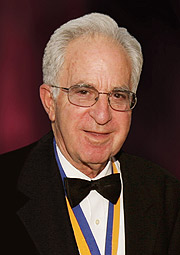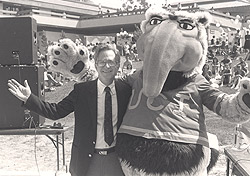Berkeleyan
Clark Kerr Medal for former UC President Peltason
Academic Senate honor goes to one-time academic who transitioned to administration - and enjoyed it
![]()
| 03 November 2005
 Jack Peltason (Courtesy UC Irvine) |
The Kerr award recognizes an individual who has made an extraordinary and distinguished contribution to the advancement of higher education. Senate Faculty Awards Committee Chair Bob Buchanan cites Peltason's "contributions to higher education, his commitment to the principles of shared governance, his outstanding scholarship, together with his being an exemplary representative of the legacy of Clark Kerr" among the reasons for designating him this year's honoree.
"I'm very honored to receive this award," Peltason told the Berkeleyan from his home in Irvine, where much of his administrative career was spent - first as vice chancellor for academic affairs of the then-new UC campus there (1964-67), later as chancellor (1983-92). "I'm honored both because it comes from the Academic Senate, and because it is named for Clark Kerr. A lot of people I know and admire have received the Kerr Medal, and I'm humbled to be in that crowd."
Peltason launched his academic career in 1947 as an assistant professor at Smith College. In 1951 he joined the political-science faculty at the University of Illinois at Urbana-Champaign, where he made his most meaningful academic contributions, on the subject of judicial process. His book Fifty-eight Lonely Men, a study of the federal district judges in the South and their role in overseeing desegregation after Brown v. Board of Education, is a classic in the discipline's literature.
His name is known to generations of students, too, as principal author (along with James McGregor Burns) of Government by the People, a textbook on American government that remained in print through 21 editions over 40 years.
| The Peltason Perspective I've frequently been amused by people who, upon leaving graduate school, think they have the truth, the only truth, and nobody else has the truth, but their version of truth depends on the accident of what their professors taught them to be true. Some people are upset when they discover that judges do not just discover the law but by necessity must participate in making it. This fact neither upsets me nor makes me cynical about the judicial process. We just have to grow up and accept the fact that there are no gods to protect us, that judges are part of the political system, and that this is good, not a bad thing. I rejected the notion that as chancellor [at UC Irvine] it was my duty to speak out against the [Vietnam] war and to use my office in behalf of political causes, including those about which I felt strongly. To me, the university is not an instrument of politics, but a community of scholars engaged in teaching and the search for the truth, with a little "t." I think [UC's] shared governance system is splendid. I think, however, we need a thorough revision of the process by which we implement [it]. It's become much too formal..[The academic] senate sometimes, by reviewing everything, has given up control over anything that's really important.. It all works - I just would like to see it streamlined, less formal, less rigid. When times are tough financially, [faculty and staff at Berkeley and UCLA] tend to see the Office of the President as a constraint . . . as an office that's keeping them from doing something, as a cause of their problems. . . .But the fact is that everybody can blame the Office of the President; it's the scapegoat of the system. If there were no Office of the President, the blame would go to their own administrators. . . . All quotations from Jack W. Peltason: Political Scientist and Leader in Higher Education, 1947-1995, an oral history conducted by Ann Lage for the Regional Oral History Office's University History Series (1998). |
'...a perpetual education...'
Peltason will likely be best remembered for his work as a university administrator over the past half century. At Urbana-Champaign he began the transition from scholarship to administration, rising to the level of dean of the College of Liberal Arts and Sciences (an appointment that Illinois president David Henry told him at the time was "against all my instincts" because of Peltason's relative youth). He found the transition less trying than others have claimed it to be, recalling years later, "I discovered I liked being a dean. You're [supposed to say] that you yearn to get back to teaching, and that you're just being an administrator as a kind of sacrifice. But I found it to be a perpetual education."
Peltason's career as a University of California administrator began in 1964, when he was persuaded to move to Southern California to serve as vice chancellor for academic affairs at the new Irvine campus. The rapid growth of UC Irvine remains a point of pride for Peltason, who recalled a few years ago that while there were only seven academics on board when he arrived, on opening day a year later there were 157, with an average age of only 36. By the mid-1990s, he said, there were two Nobel Prize winners and a slew of National Academy members.
In 1967, Peltason was asked to become the first chancellor of the University of Illinois, and so left Irvine after what he called "three indelible years." He guided Illinois' transition to a chancellorian system from a presidential one - the same transition the University of California undertook when Clark Kerr became chancellor of Berkeley in 1951 - and he arrived just in time to deal with the rising tide of student unrest. "It was not a good time to be a university administrator," he said years later. "The people on the two extremes were doing their best to turn the universities into political instruments." Illinois got through that period of unrest "with considerable success," Peltason continued, "because the faculty by and large backed me, and because I wouldn't allow the faculty not to get involved." (He also later speculated, humorously, that "another reason the protests stopped [in the early 1970s] was that once the kids got visitation in the dormitories, they were too pooped to protest.")
After 10 years at Urbana-Champaign, Peltason began a seven-year stint as president of the American Council on Education in Washington, D.C., where, he once guessed, he "got to know more college and university presidents than anybody in the United States." The council is an umbrella organization charged with coordinating the activities of academic associations nationwide.
In 1984, Peltason returned to California, where he spent the rest of his administrative career - first as chancellor of UC Irvine, where he served until 1992 ("the most positive eight years of my administrative life"), and then as president of the UC system. His years at Irvine - in sharp distinction to his three-year stint as UC president - were, one university historian has said, "an expansive time of good budgets, new programs, and new facilities." Among his achievements as chancellor, Peltason created a Think Tank on Diversity, secured for Irvine the Humanities Research Institute created by UC President David Gardner, and reorganized the School of Social Sciences. He was also an aggressive pursuer of private monies for research and an avid recruiter of top-notch faculty.
 As chancellor at UC Irvine during the go-go '80s and early '90s, Peltason had much to smile about. (Courtesy UC Irvine) |
The budget crisis - not dissimilar from the one UC has most recently faced - proved the most persistent and crucial problem. Peltason dealt with it with a range of actions, including substantial student-fee increases and budgetary "efficiencies." He authorized the first of what became three annual Voluntary Early Retirement Incentive Plans (VERIPs), intended to reduce the impact of top faculty and staff salaries on the operating budget. Ultimately, he negotiated a four-year "compact" with Gov. Pete Wilson, under which the governor pledged to guarantee a small percentage of general-revenue funding to the university while it developed strategies to recover from the ravages of seemingly endless budget cuts.
"That compact," Peltason later said, "stopped the downward spiral of the University of California, stabilized us, and made it possible for us within two or three years to get back to the growth mode, to . recover from some of the damages of those five years of budget cutting.. We were operating the university with 900 million fewer state dollars than we would have had."
The other major issue of Peltason's presidency was affirmative action - specifically, the controversy surrounding Ward Connerly's proposal to the regents that the university abandon race as a factor in admissions. Though himself a strong and consistent advocate of affirmative action, Peltason was anxious to ensure that, once the decision was made one way or the other, there would not remain "such permanent wounds among the regents and between the regents and the university administration, faculty, and student body as to undermine our ability to carry out our educational functions." The regents ultimately voted in favor of Connerly's proposal; in response Peltason chose to focus on developing and strengthening outreach efforts that would improve minority-student access to the university while remaining within the confines of the regents' decision.
Peltason retired as UC president in 1995. Though slowed somewhat by illness - he has developed Parkinson's disease - he retains his faculty position in Irvine's School of Social Sciences, as well as his stature as President Emeritus of the University of California. The Nov. 8 presentation of the Kerr Medal will give Berkeley colleagues a chance to pay tribute to a UC leader who, again in the words of Richard Atkinson, "had an impact on the institution out of proportion to the brevity of his tenure."

